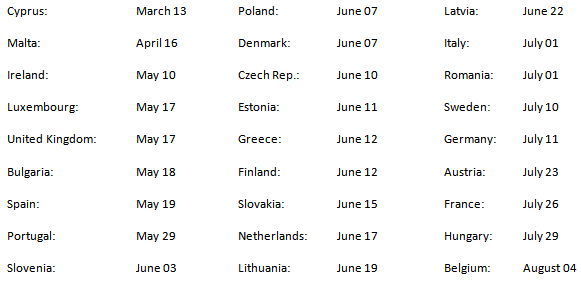Tax Freedom Day: Belgian Employees are Highest-Taxed in EU 27
Media Release
PARIS (4 AUGUST 2011) — A typical Belgian employee, earning a gross salary of 38,659 € per year, worked until today to pay his tax bill, according to Institut Economique Molinari (IEM). This year’s “tax freedom day” for Belgium is one day later than in 2010.
The second annual study, published by IEM using tax calculations from Ernst & Young, compares employment taxes, social security contributions and VAT paid by an « Average Joe » in each of the 27 European Union member states. Using this data, a “Tax Freedom Day” is calculated for each country. Tax Freedom Day is the day in the calendar year on which a worker theoretically stops working for the state and begins to keep his/her earnings.
The 2011 dates for the EU 27 are:

Key findings of the study (full data table here in English and here in French) include:
• Of the total cost of employing a typical worker in Belgium, 55.8% goes directly to paying taxes and social security contributions. This figure is the highest in the EU27. (Cyprus is the lowest at 14.5%.)
• Taxes are on the rise in Europe. The average real tax rate for typical EU wage earners Europeans rose by 0,25% in 2011 – due mostly to VAT increases in 13 member states.
• Flat tax policies have offered considerable tax relief to workers – notably in Hungary, where a new 16% rate has pushed that country’s tax freedom day forward by 9 days. However, total taxes remain higher in « flat tax » countries (46.4%) than in « progressive » systems (43.3%) – a gap that has widened since 2010.
• 42.8% of all payroll taxes collected in the EU – employer contributions to social security paid on top of gross salaries – are largely invisible to employees.
James Rogers, co-author of the study, said:
« Every time a Belgian company puts 1€ into a worker’s pocket, it must put 1,43€ into the state’s coffers – a ratio that increases toward 1,80€ for management employees. In today’s competitive, highly mobile labour market, such a policy is unattractive to employers. To remain competitive, Belgium faces a simple choice: pay employees less, or pay the government less. »
« When InBev proposed Belgian layoffs in January and blamed the financial crisis, Joëlle Milquet suggested the company’s real motivation was to save money by moving jobs to Eastern Europe. In this case, the politician is speaking the truth: jobs are leaving Belgium because they cost too much. »
Cécile Philippe, director of IEM, said:
“The situation is worrisome. Six of the 27 EU members take more than half of what typical employees earn for social security contributions, income taxes or VAT. And despite this very high level of taxation, deficits continue to rise as never before in Europe.”
Geoffrey Van Orden MEP (UK) and President of New Direction Foundation, said:
“Too many [European] governments responded to excessive deficits by increasing taxes instead of reforming and cutting the spending of the state. People are already paying too much, therefore the tax burden should be going down not up.”
The study, written by James Rogers and Cécile Philippe of Institut Economique Molinari (Paris), analysed income figures from Eurostat and OECD and tax calculations made by Ernst & Young. The study was sponsored by New Direction Foundation in Brussels.
For information, please contact :
Cécile Philippe – Director, Institut économique Molinari
cecile@institutmolinari.org
+33 6 78 86 98 58
James Rogers – Associate Researcher, Institut économique Molinari
james@institutmolinari.org
+ 32 497 946 840






